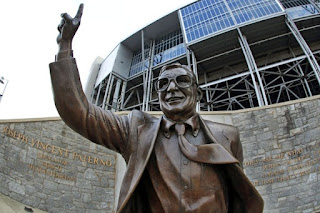A Legacy Soiled
"All that is necessary for the triumph of evil is that good men do nothing." — Unknown
On Thursday, Louis Freeh offered a report on the scandal that rocked Penn State University. It was nothing short of damning of those in authority, including head football coach Joe Paterno.
Of the school's leadership, Freeh said, "Our most saddening and sobering finding is the total disregard for the safety and welfare of Sandusky's child victims by the most senior leaders at Penn State." With that, the final tide began to turn on one of the most decorated coaches in the history of college football.
It seems hard to believe that as recently as last October most agreed Paterno was one of the greatest college football coaches of all time. Now, his name will be forever linked with perhaps the greatest moral failing of any sporting institution in history. But how did we get here?
Last fall, when the Penn State scandal broke, I was angry that most seemed to be giving Paterno a pass. He was fired by the university, and he later died of cancer, but most analysts said the troubles that cost him his job would be a blip on his career radar. It seemed inconceivable to me then, and now, that a man, no matter how great his professional accomplishments, could get pass for callously overlooking the violation of innocents. Yet that seemed to be the case.
But following the report released Thursday, even his most ardent supporters have trouble singularly praising Paterno's achievements. The scandal that cost him his job is now, and likely forever will be, among the first things mentioned in his autobiography. That is as it should be. But now it seems like the pendulum has swung to totally blaming Paterno for everything. That, too, gives me a moment of pause.
There is plenty of blame to spread around in this tragic turn of events, but the buck doesn't stop with Joe Paterno. He failed to act, but why should it have been solely up to him? He deserves criticism and the tarnishment of his legacy, but he's not the only one to blame for this.
The school's athletic director could have acted. Many times athletic directors have acted in the best interest of students, schools, or the community against the wishes of high-profile coaches. This was an area where there was a moral imperative to act, yet Jeremy Curley didn't. And what of Penn State's president and vice president. Their job is to safeguard the university — not the football program. Yet they didn't act and stop this injustice when they could either.
Yes, Paterno erred. Yes, an egregious lack of judgement was shown. And, yes, people suffered. Paterno should be held accountable for his inaction, but so too should all those others who were in a greater position of authority and were all too happy to look the other way.




Comments
Post a Comment